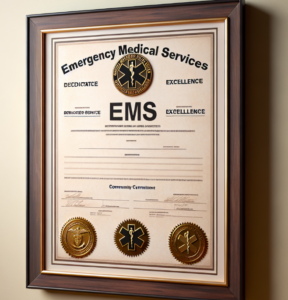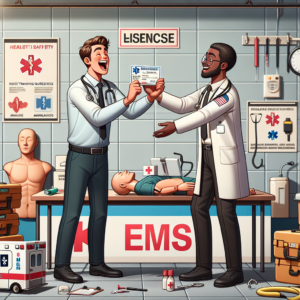 Embarking on a career path in Emergency Medical Services (EMS) necessitates a solid foundation, starting with rigorous education and achieving the necessary certifications. Those aiming to become Emergency Medical Technicians (EMTs) must engage in rigorous training to build the competencies required for delivering critical emergency medical care during some of life’s most urgent situations.
Embarking on a career path in Emergency Medical Services (EMS) necessitates a solid foundation, starting with rigorous education and achieving the necessary certifications. Those aiming to become Emergency Medical Technicians (EMTs) must engage in rigorous training to build the competencies required for delivering critical emergency medical care during some of life’s most urgent situations.
The journey begins with enrolling in an education program recognized and sanctioned by the state. These programs are designed to cultivate a blend of theoretical knowledge and practical skills. Classroom instruction delves into topics such as human anatomy, medical procedures, and legal issues related to healthcare practice. Alongside, hands-on training in real-world scenarios is conducted, often through simulated emergency situations. These experiential learning components are crucial for equipping aspiring EMTs with the confidence and competence to handle emergencies.
After the educational component is completed, the certification process is the next critical step. Certification is typically obtained through passing a national examination, such as the one administered by the National Registry of Emergency Medical Technicians (NREMT). This certification process is a rigorous evaluation of the candidate’s knowledge and skills, ensuring they are ready to meet the demands of the role.
Upon receiving national certification, candidates must then secure state licensure, which is mandatory to practice in the field. States may have divergent requirements including additional exams, thorough background checks, and mandated continuous education aimed at reinforcing skills and knowledge.
Maintaining a licensure is an ongoing process that requires EMS professionals to engage in continuous education and fulfill recertification requirements regularly. The dynamic nature of the healthcare industry demands that EMS professionals stay current with emerging medical practices and evolving protocols.
Professional development opportunities available to EMTs further include advanced certifications, leading to enhanced roles within EMS. Progressing from the EMT level to more advanced roles, such as Advanced EMT or Paramedic, entails more in-depth education and mastery of more complex medical procedures.
Within EMS career paths, the extent of personal growth and service to the community is significant. As first responders, EMTs hold a vital position within the healthcare system, frequently being the initial point of contact for individuals in times of medical emergencies. Their preparedness and ongoing commitment to learning are essential to the fabric of emergency medical services, playing a direct role in saving lives and improving patient outcomes.
Due to the nature of their work, EMS professionals are also encouraged to focus on their own well-being. The intense physical and emotional demands of emergency medical care can take a toll, making self-care and supportive resources critical to career longevity and effectiveness.
The commitment to education, achieving and maintaining certifications, and continuous professional improvement lie at the core of EMS careers. This foundation paves the way for advancements in their professional life and contributions to the broader healthcare community.
Specialization and Advanced Credentials
The pathway to advanced credentials and specialization within Emergency Medical Services (EMS) opens doors to heightened levels of responsibility and a deeper engagement with medical practice. Emergency Medical Technicians (EMTs) can progress to Advanced EMT (AEMT) or reach the Paramedic level, which are roles that necessitate a broader spectrum of knowledge and the proficiency to handle intricate medical procedures.
EMTs aspiring to become AEMTs or Paramedics must undertake rigorous education that typically includes an in-depth study of anatomy and physiology, as well as mastering advanced life support techniques. Training involves the administration of a diverse array of medications and the use of sophisticated medical equipment. This progression prepares EMS professionals to address more severe health conditions and provide a higher quality of care during emergencies.
Specialization in the EMS field allows practitioners to concentrate their skills on particular care areas or demographic groups. This could involve becoming a critical care paramedic, working in aeromedical transport as a flight paramedic, or honing skills to better serve pediatric or geriatric communities. Diving into these specialized sectors requires EMS professionals to complete additional coursework, engage in hands-on clinical experiences, and typically obtain specialized certifications. Through this dedication to ongoing professional development, they become adept at handling the intricacies of their chosen focus, thereby better-serving patients with complex needs and contributing to community health and well-being.
These professionals are equipped with a comprehensive understanding of diverse patient care strategies. Their advanced and specialized capabilities make them prime candidates for leadership positions within their departments or agencies. Moving into such roles, EMS professionals can influence the policies, procedures, and strategic direction of the services they represent. Their advanced insight is frequently recognized and rewarded with improvements in salary and a wider array of career advancement opportunities.
EMS providers who invest in their professional growth through advanced credentials and specialization contribute markedly to the field. Their advanced training allows them to operate more autonomously and effectively, in turn enhancing the collective capacity of emergency medical services. As medical emergencies and community health needs evolve, the demand for highly trained and specialized EMS personnel continues to rise, reflecting the critical role these dedicated professionals play in the broader healthcare system.
Leadership and Management Opportunities in EMS
 Leadership and management opportunities within Emergency Medical Services (EMS) serve as vital avenues for seasoned EMS professionals who aim to influence and direct the course of the field. Those with a robust background in field operations possess the requisite experience and expertise to ascend to higher roles such as supervisors, managers, or directors of EMS organizations.
Leadership and management opportunities within Emergency Medical Services (EMS) serve as vital avenues for seasoned EMS professionals who aim to influence and direct the course of the field. Those with a robust background in field operations possess the requisite experience and expertise to ascend to higher roles such as supervisors, managers, or directors of EMS organizations.
Taking on a leadership role requires a distinctive mixture of field operations savvy, administrative acumen, and sometimes an advanced educational background. Degree programs such as a bachelor’s or master’s in health administration or similar disciplines are often the academic foundation for such positions.
In positions of command, EMS leaders oversee teams, formulate operational guidelines, engage with communities, and ensure adherence to regulatory requirements set by state and federal healthcare entities. Those in management are tasked with fiscal oversight, allocation of resources, and laying out of long-term strategic plans.
Progression into leadership within EMS also gives seasoned professionals the ability to influence training programs for new staff members, thus driving systemic improvements throughout the EMS landscape. This evolution from hands-on emergency care to mentorship roles allows experienced professionals to disseminate their knowledge, facilitating the professional growth of the workforce.
Senior roles enable established EMS professionals to champion the field by participating in policy development and pushing for the acquisition of vital resources. This is integral to the sustainability and enhancement of emergency medical services.
Career advancement in the EMS realm is cultivated by a dedication to lifelong learning and consistent professional upskilling. Beginning with the initial steps as an Emergency Medical Technician (EMT) and advancing through specialized paramedic positions to leadership, the EMS career pathway offers extensive prospects for professional progress. As EMS personnel diversify their skill sets and pursue higher qualifications, they can anticipate a gratifying career progression that serves the broader health and safety needs of the communities to which they dedicate their service.
Cultivating talents and acquiring higher qualifications are important for EMS professionals pursuing a path of professional development. As the scope of services within the EMS spectrum expands and adapts to the needs of the modern healthcare environment, ongoing education and progressive responsibility are key for those seeking to ascend within their profession. With this focus on continuous improvement, EMS leaders play an instrumental role in shaping responsive, effective emergency medical care that aligns with the dynamic necessities of public health and safety.
